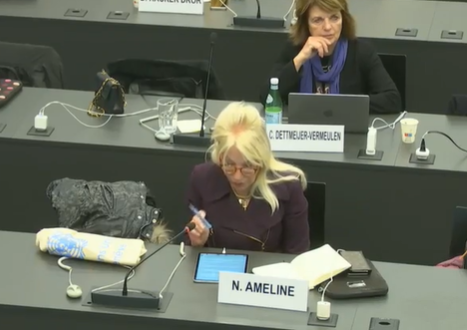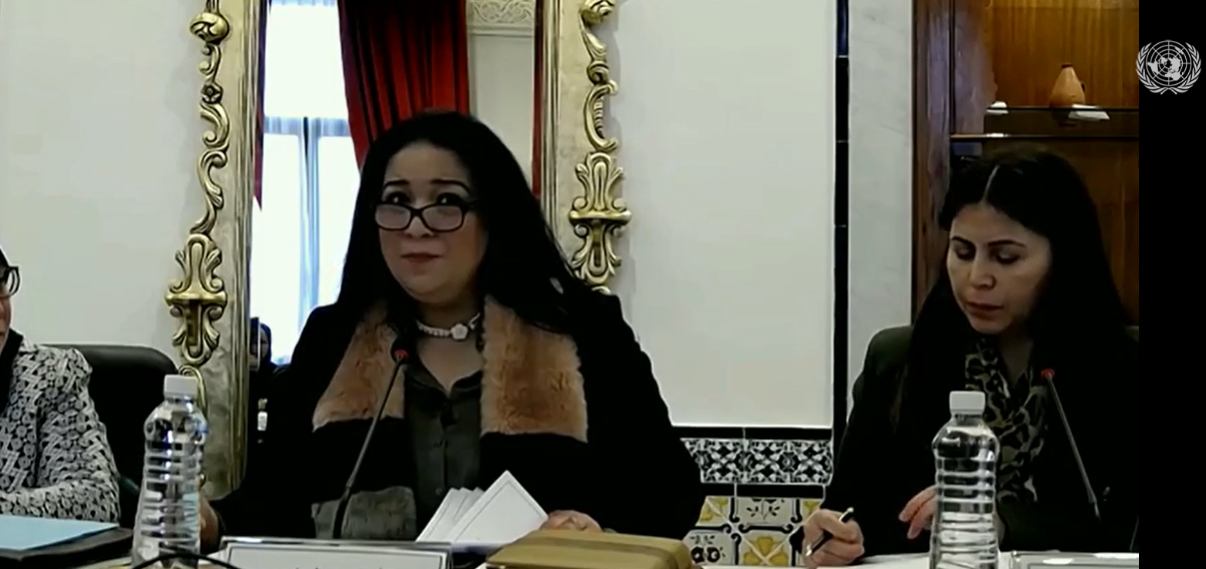CEDAW 84th session: Concerns raised over Tunisia’s gender approach political participation agenda.

Juanita Beltran / GICJ
Executive Summary
“Combatting all forms of discrimination against women is not only a subject of concern for women but of all members of society”, affirmed the prime minister of Tunisia during the 84th session of the Commission for the Elimination of Discrimination Against Women (CEDAW). On the 10th of February 2023 Tunisia presented its 7th periodic report since its last review on the progress made and challenges remaining in achieving gender parity, the elimination of all forms of violence against women and girls, and equal opportunities in all spheres, among other topics.
Background
The Committee on the Elimination of Discrimination against Women (CEDAW) is a body of independent experts that monitors the implementation of the International Convention on the Elimination of All Forms of Discrimination against Women. The main objective of the Convention is to eliminate all attitudes, practices and preferences based on sex, which puts women in an unfavourable position in society. The state party’s signatory to the Covenant must then present cyclical reports about the progress made pertaining to legislative frameworks or other administrative measures.
Tunisia signed the International Convention on the Elimination of All Forms of Discrimination against Women on 24 July 1980. It was ratified by Act No. 68 (1985) on 12 July 1985. Tunisia subsequently ratified the Optional Protocol on June 9th, 2008.
Interactive Dialogue
First, the floor was given to the head of the prime minister Njla Bouden, who made some introductory remarks on the international commitments of Tunisia, highlighting the legislative advancements on women's rights. For instance, its ratification of the Maputo protocol. This protocol dictates the African Charter on Human and Peoples Rights on the Rights of Women in Africa. Additionally, she made allusions to institutional frameworks that seek to fight gender violence or encourage women into science. Prime minister Bouden, also pointed out the negative effects the pandemic brought to women and measures taken by the state to counteract the situation. For example, Tunisia established shelters for victims of domestic violence and their kids, hotlines for psychological guidance, payments, and loans to institutions, among others.
Part I – Discrimination, fundamental freedoms and gender equality
Part I of the Convention comprises articles 1 to 6, where topics such as discrimination, policy measures, the implementation of basic human rights and fundamental freedoms, special measures for accelerating equality, sex role stereotyping and prejudice and prostitution were discussed.
 Expert Nicole Ameline then proceeded to lead the first cluster of questions. She highlighted the need for more concrete parity in the domestic decree 55 of 2017, which is the reason why few female candidates are running for office. Another of her queries addressed the lack of integration of Amasiri women in policies for combating discrimination. Lastly, she asked about access to justice and its structure as well as its independence.
Expert Nicole Ameline then proceeded to lead the first cluster of questions. She highlighted the need for more concrete parity in the domestic decree 55 of 2017, which is the reason why few female candidates are running for office. Another of her queries addressed the lack of integration of Amasiri women in policies for combating discrimination. Lastly, she asked about access to justice and its structure as well as its independence.
The delegation responded that the new election act recognizes parity by nominations. It was explained that the absence of the parity principle, explicitly enshrined in Article 51 of the constitution of 2012 but not in Decree 55 of 2022, is due to the voting method. This procedure is based on the equality of individuals treating them in an equal manner. The delegation clarified further that especially since women have reached a degree of “awareness” that allows them to participate without adopting any measures in their favour. This new method was acquired mainly because, in the previous method, political parties included women in their electoral lists to merely meet the requirements. It was stated that laws remain subject to review due to its recent ratification. It also recognised that gender discrimination requires legislative and economic action but is still part of the “cultural change”. Considering access to justice, the ministry is currently working on providing legal aid together with the UNDP to facilitate accessibility. The report found that the ministry has also developed a legal guide for women victims of violence and has held several training courses on that guide. [1] Finally, the delegation stated that Amasiri people, as Tunisians, enjoy the same rights as other citizens.
Experts Ms. Eghobamien and Ms. Ferrer asked about measures taken to prevent girls from sexual exploitation and to prevent trafficking in person. Further questioning regarded tools developed for citizens to be aware of trafficking. Due to its high rates involving forced labour and forced prostitution. Between 2019 and Februara 2020, the National Authority identified 1,313 trafficking victims. [2]
The delegation responded to the queries by first acknowledging the National Strategy for the Economic and Social Empowerment of Rural Women and Girls, which includes a focus on the participation of women implemented by the regional structure of the Ministry of Women's Affairs. This plan provides legal, social and economic education and counselling services. Regarding combating trafficking in persons, the delegation stated that the National Authority to Combat Trafficking in Persons had organised awareness-raising campaigns conducted mainly by the civil society or international organisations. These comprise speeches, conferences, and visits to rural areas, including Tik Tok and Facebook campaigns. Considering the revision of the penal code, the delegation commissioned a draft sent to relevant ministries on the Criminal Procedure Code and is still pending for which it is not possible to comment on the content of articles 231 and 232 on prostitution.
Part II Political and public life, representation, and nationality
Expert Ms. De Silva de Alwis focused on article 4 of the convention. She questioned the staggering erosion of women’s electoral participation in the 2022 elections. In previous years Tunisia had established a gender quota for the elections. Now that they are not in place, the expert criticised this and added that quotas for persons with disabilities must be introduced, as well as for gender quotas in stimulus packages in light of the pandemic recovery plan.
previous years Tunisia had established a gender quota for the elections. Now that they are not in place, the expert criticised this and added that quotas for persons with disabilities must be introduced, as well as for gender quotas in stimulus packages in light of the pandemic recovery plan.
The delegation responded that in terms of training, the circular No. 27 of 2018 on the development of annual training plans requires ministries and public institutions to mainstream gender and involve women in training. It was reiterated that the absence of the parity principle is explained by the fact that the voting method based on individuals requires treating candidates on an equal footing, especially since women have reached a degree of awareness that allows them to participate in political life without the need to adopt special measures in their favour. Still, the answers of the delegation failed to acknowledge that gender quotas stimulate the market demand for high-skill labour in such a way that while in the long run, it might be a possibility to remove them and achieve gender parity in the workplace and political institutions, in the short run the market is not tailored to the specific needs of women, where although they might have the same qualifications, the market requirements are still earmarked for men. Therefore, stereotypical and exclusionary attitudes toward women still prevail.
Part III Education, Employment, Health, Economic and social benefits, Rural women
On measures related to education, expert Xia congratulated the steady increase in enrollment for women who graduated from public institutions. However, she requested the delegation to provide the progress on the development of the programs and their outcomes for women in education. Among other things, the expert asked the state party if it provides scholarships and financing for disadvantaged groups in rural areas. Further, the expert questioned the integration of health courses into the curriculum and the spectrum of subjects that the curriculum covers. Employment expert Ms. Maidar expressed concerns over the rate of women in the agriculture sector, the informality of domestic workers often hired without contracts, minimum wage, or scheduled management of hours. Additionally, she criticised the lack of labour inspection and access to social security. This poses several obstacles to women in starting business, contrary to men. In that same vein, the expert asked for parental leave for men and the progress reached thus far.
The delegation started by showing the drop in unemployment rates among women, before at 23% and this year at 20%. In the area of education, it was reported that the government had issued economic empowerment programs for mothers of students at risk of dropping out of school. Around 1000 women benefited from this program between 2021 and 2022. Along that same line, digital literacy courses have been introduced for disabled women. According to the delegation, these courses are adapted to and compatible with the different visual, auditory, sensory, motor and intellectual disabilities of disabled women. Projects underway were as well presented in cooperation with the ministry of education, which aim at changing the stereotyped images of women in school syllabuses. Other measures taken consisted of combating sexual abuse. For this the school’s curriculums were modified.
Regarding labour inspections for domestic workers, Tunisia referred to law No 20-2021 on domestic work, which provides for control and inspection mechanisms that are carried out by the labour inspectors and controllers of the National Social Security Fund. However, no explicit actions of these specific inspections that target the promotion and guarantees of the workers were addressed. The delegation mentioned law 37 adopted in July 2021 to guarantee the rights of domestic workers. Presumably a contract would be adopted which would guarantee better social protection and the right to weekly holiday and annual leave for domestic workers.
Geneva International Centre for Justice (GICJ) commends the efforts of Tunisia in its 7th report presented to the Commission for the Elimination of Discrimination Against Women in its 84th session. However, we stress the fact that challenges are still remaining mostly in the political participation of women in the parliament, as well as in employability policies. The Tunisian government has to acknowledge the fact that there are still obstacles for women in high rank positions, which have long been beset by men. If the market wants a highly skilled female-driven workforce, gender quotas need to be put in place. Additionally electoral participation needs to be more inclusive and integrate different sectors of society, like amasiri women and other marginalised groups.
Geneva, Geneva4justice, Tunisia, 7th report, 84th session, CEDAW, gender inequality, women
References
[1] Réponse complémentaire écrite présentée par la délégation dans le cadre du dialogue constructif - Information complémentaire
[2] 7 Facts About Human Trafficking In Tunisia - The Borgen Project







